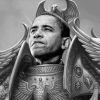- 17 Jun 2013 16:07
#14256069
No, that's a fallacy: the government serves to counteract the ultra-rich: even if it's 90% bought then 10% of it is still working against the ultra-rich. Most of the time the ultra-rich use the government to undo older government regulation. Without a government there would be no regulations to fight, nothing that can harm the ultra-rich. They wouldn't have to massage the commander in chief, they could just buy an army. Naturally they would also control all forms of charity so they'd have a level of power over people's private lives that religious conservatives can only dream of. The Koch Brothers could then finally decide with 100% certainty if people can have an abortion or not (only at private hospitals the choice would exist but those would be unaffordable to msot people).
Eran wrote:False. In fact, ultra-rich are much more powerful when there is a government for them to corrupt and buy.
The weaker government is, the less power the ultra-rich have.
No, that's a fallacy: the government serves to counteract the ultra-rich: even if it's 90% bought then 10% of it is still working against the ultra-rich. Most of the time the ultra-rich use the government to undo older government regulation. Without a government there would be no regulations to fight, nothing that can harm the ultra-rich. They wouldn't have to massage the commander in chief, they could just buy an army. Naturally they would also control all forms of charity so they'd have a level of power over people's private lives that religious conservatives can only dream of. The Koch Brothers could then finally decide with 100% certainty if people can have an abortion or not (only at private hospitals the choice would exist but those would be unaffordable to msot people).













 - By wat0n
- By wat0n